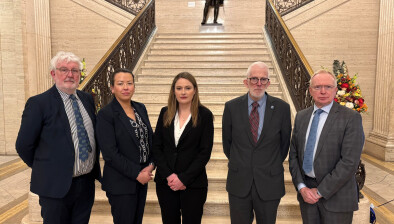Eamonn Rea: Confessions, credibility and automatic exclusion

Eamonn Rea
Northern Ireland barrister Eamonn Rea examines a recent case involving the admissibility of confessions.
The 2020 Northern Ireland Court of Appeal case of R v Kevin Barry Artt [2020] NICA 28, and my own two-year professional involvement in that case, highlighted for me a question surrounding police interviews and suspect confessions which, although not directly dealt with in that appeal case, was brought to the forefront of my mind. It remains a legal area ripe for reform in the Northern Ireland and English and Welsh jurisdictions, and so I was inspired to write my recent article in the Northern Ireland Legal Quarterly.
In that article, entitled ‘What happened in there? Confessions, credibility and automatic exclusion: the case of Artt and confession admissibility’, I argue that a particular scenario which can come before the courts – involving a police interview and a resultant confession whose admissibility is contested on the basis that the police did something to induce the confession, something which the police deny – is inadequately catered for within the current Police and Criminal Evidence Act 1984 (PACE) regime.
I argue that if, taking the defendant’s allegations at face value, those allegations would lead to exclusion of the confession due to oppression or unreliability as per the current PACE regime, the defendant’s allegations should be accepted as conclusive truth of what in fact happened, and the confession excluded automatically. The only scenario in which this could occur is where PACE Codes C, E and F are not adhered to insofar as they require the recording of interviews. In other words, the court has no objective basis to determine what in fact occurred in the interview room.
A court faced with this scenario, under the current law, is compelled to decide whether to believe the defendant’s version of events or that of the police . For various reasons, the police’s version of events is typically accepted and the defendant’s allegations disregarded. The lack of compliance with the PACE Codes, and any subsequent impact on the confession’s admissibility, is then assessed independently of the allegations. The courts have shown a preference for assessing Code breaches and the impact on a confession’s admissibility with regards to the discretionary power under Article 76 PACE.
In short, two problems arise in this scenario. Firstly, the defendant’s allegations are more often than not dismissed as fiction. Secondly, the breaches of the Codes themselves, again more often than not, are held not to impact on the admissibility of the confession or are not deemed serious enough to urge the judge to exercise their discretion under Article 76. The result is that the confession is deemed admissible. Its unparalleled weight in determining the guilt of a defendant is inevitable; confessions remain the most damning evidence in a prosecutor’s arsenal, being, as they are, phenomena of a suspect speaking against their own interests. Throughout history, the confession was seen as indisputable and conclusive evidence of a suspect’s guilt, for who would incriminate themselves falsely? Only in the last few decades have certain circles, led by renowned psychologists, begun to appreciate the phenomenon of false confessions. Nevertheless, the confession remains a persuasive piece of evidence in determining a defendant’s guilt.
In my article, I argue that the current law fails to grasp the importance of the Codes in ensuring reliable confessions, namely by providing an objective, accurate and fair recording of police interviews. I argue that the importance of the Codes centres around protection for both the accused and the police alike. I further argue that without that protection, in cases where the defendant alleges something occurred in the interview room which impacts on the confession’s admissibility, that allegation should be given the benefit of the doubt and accepted by the court as conclusive evidence.
I entertain a less draconian, middle-way approach between the current law and the advocated automatic exclusion. That middle-way approach is that of a rebuttable presumption in favour of exclusion of the confession. Such a rebuttable presumption is favoured in several, contemporary US jurisdictions, and indeed featured under old Northern Ireland legislation. I nevertheless come down in favour of automatic exclusion instead. Broadly, I reject the rebuttable presumption option because it mischaracterises the question of admissibility and the Codes as a game of competing interests, rather than a question of reliability. A contemporaneous and accurate record of police interviews is the very foundation upon which a resultant confession is considered reliable, without which reliability cannot be effectively gauged by submissions advanced by prosecution counsel (in rebutting the presumption) given what we are only recently beginning to know about the subtlety of unreliable confessions.
The 1983 trial of Kevin Barry Artt serves both as a case study of the scenario discussed in this article and the failure of a rebuttable presumption approach. The defendant was interviewed for the murder of Albert Miles. He made a confession to the murder, which was the only evidence against him at trial. He alleged multiple instances of abuse, both physical and verbal, which induced him to make a false confession. Under the Northern Ireland (Emergency Provisions) Act 1978, this could give rise to a rebuttable presumption that the confession was obtained by torture or inhuman and degrading treatment, leading to exclusion. The trial judge heard evidence in which the police witnesses denied that the defendant’s accusations happened. They also gave evidence that the notes they had made in the interviews were done contemporaneously. The court accepted the evidence of the police and convicted the defendant.
Thanks to ESDA (electrostatic detection apparatus) technology not available during the trial, the police interview notes were demonstrated not to have been in fact made contemporaneously; in other words, the police had told untruths during evidence. It was that fact that gave the Court of Appeal unease about the conviction. If the police had told untruths regarding the records, it was not impossible that they had also told untruths in responding to the defendant’s allegations. The appeal was subsequently allowed.
If my suggestions had been implemented in 1983, Artt might not have been convicted. Going forward, the suggestions I make for the most part would apply to cases on appeal tried pre-PACE, but they would also cover contemporary cases in which PACE Codes were not followed for whatever reason. The suggestions of the article may also be of application to other jurisdictions where recording of interviews is not routine. The common denominator is the avoidance of unjust convictions, a goal we can all get behind.
- This article was first published in the Northern Ireland Legal Quarterly blog.









